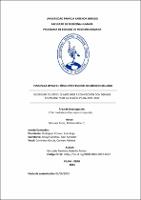Mostrar el registro sencillo del ítem
Severidad de Covid-19 asociado a coinfección con dengue en pacientes de la región Piura 2021-2022
| dc.contributor.advisor | Gonzalez Ramirez, Rodolfo Arturo | |
| dc.contributor.author | Morales Tapia, Michael Alberto | |
| dc.creator | Morales Tapia, Michael Alberto | |
| dc.date.accessioned | 2023-07-14T16:29:58Z | |
| dc.date.available | 2023-07-14T16:29:58Z | |
| dc.date.issued | 2023 | |
| dc.identifier.uri | https://hdl.handle.net/20.500.12759/10875 | |
| dc.description.abstract | OBJETIVO: Determinar la asociación entre la severidad de la COVID-19 y la coinfección por dengue en Piura 2021-2022. METODOLOGÍA: Estudio de casos y controles anidados en una cohorte. La cohorte fue construida empleando datos retrospectivos, mediante los registros de todos los pacientes con diagnóstico de COVID-19 y todos los que fueron diagnosticados con dengue en el periodo 2021-2022. Los casos fueron los pacientes con diagnóstico positivo para ambas infecciones y los controles fueron pacientes con COVID-19 únicamente seleccionados aleatoriamente. Se emplearon registros temporales para enlazar la información requerida. Se ejecutaron modelos de regresión logística multinomial para comparar la probabilidad de tener COVID-19 moderado o severo frente a la probabilidad de tener COVID-19 leve, comparando los pacientes con y sin coinfección por virus del dengue. Se empleó el software STATA v.17 para el análisis estadístico. RESULTADOS: Se evaluaron 416 pacientes con COVID-19 de los cuales 208 presentaron coinfección con virus del dengue. Del total de participantes, el 4.3% fueron casos severos y el 42.3% moderados. El 8.2% y 71.6% de los pacientes con coinfección con dengue fueron casos COVID-19 severos y moderados respectivamente; mientras que, en los pacientes con resultados negativos para dengue, el 0.5% y 12.9% fueron casos COVID-19 severos y moderados, respectivamente. CONCLUSIÓN: En la población de estudio, aquellos que presentaron coinfección con Dengue tuvieron 18 veces más probabilidad de presentar COVID-19 moderado y 32 veces más probabilidad de presentar COVID-19 severo, ajustando por edad, sexo, hipertensión arterial, diabetes mellitus y obesidad. | es_PE |
| dc.description.abstract | OBJECTIVE: To determine the association between the severity of COVID-19 and dengue coinfection in Piura, 2021-2022. METHODOLOGY: Case-control study nested in a cohort. The cohort was built using retrospective data, through the records of all patients diagnosed with COVID-19 and all those who were diagnosed with dengue in the period 2021-2022. The cases were the patients with a positive diagnosis for both infections and the controls were only randomly selected patients with COVID-19. Temporary records were used to link the required information. Multinomial logistic regression models were run to compare the probability of having moderate or severe COVID-19 versus the probability of having mild COVID-19, comparing patients with and without dengue virus coinfection. STATA v.17 software was used for statistical analysis. RESULTS: 416 patients with COVID-19 were evaluated, of which 208 presented coinfections with dengue virus. 4.3% were severe cases and 42.3% moderate. 8.2% and 71.6% of patients with dengue coinfection were severe and moderate COVID-19 cases, respectively; while, in patients with negative results for dengue, 0.5% and 12.9% were severe and moderate COVID-19 cases, respectively. CONCLUSION: In the study population, those who presented coinfection with Dengue were 18 times more likely to present moderate COVID-19 and 32 times more likely to present severe COVID-19, adjusting for age, sex, arterial hypertension, diabetes mellitus, and obesity. | en_US |
| dc.description.uri | Tesis | es_PE |
| dc.format | application/pdf | es_PE |
| dc.language.iso | spa | es_PE |
| dc.publisher | Universidad Privada Antenor Orrego | es_PE |
| dc.relation.ispartofseries | T_MEDP;393 | |
| dc.rights | info:eu-repo/semantics/openAccess | es_PE |
| dc.rights.uri | https://creativecommons.org/licenses/by/4.0/ | es_PE |
| dc.source | Universidad Privada Antenor Orrego | es_PE |
| dc.source | Repositorio Institucional - UPAO | es_PE |
| dc.subject | Severidad | es_PE |
| dc.subject | COVID-19 | es_PE |
| dc.subject | Dengue | es_PE |
| dc.subject | Coinfección | es_PE |
| dc.title | Severidad de Covid-19 asociado a coinfección con dengue en pacientes de la región Piura 2021-2022 | es_PE |
| dc.type | info:eu-repo/semantics/bachelorThesis | es_PE |
| thesis.degree.level | Título Profesional | es_PE |
| thesis.degree.grantor | Universidad Privada Antenor Orrego. Facultad de Medicina Humana | es_PE |
| thesis.degree.name | Médico Cirujano | es_PE |
| thesis.degree.discipline | Medicina Humana | es_PE |
| dc.subject.ocde | https://purl.org/pe-repo/ocde/ford#3.02.27 | es_PE |
| renati.advisor.orcid | https://orcid.org/0000-0001-5072-1672 | es_PE |
| renati.author.dni | 74159562 | |
| renati.advisor.dni | 02883257 | |
| renati.type | https://purl.org/pe-repo/renati/type#tesis | es_PE |
| renati.level | https://purl.org/pe-repo/renati/level#tituloProfesional | es_PE |
| renati.discipline | 912016 | es_PE |
| renati.juror | Rodriguez Chavez, Luis Angel | |
| renati.juror | Arroyo Sanchez, Abel Salvador | |
| renati.juror | Contreras Garcia, Carmen Adriana | |
| dc.publisher.country | PE | es_PE |
Ficheros en el ítem
Este ítem aparece en la(s) siguiente(s) colección(es)
-
Medicina Humana [2969]




